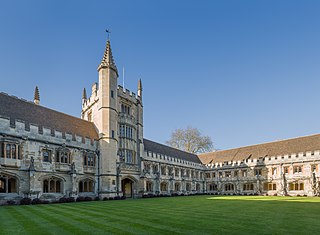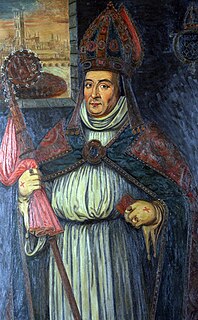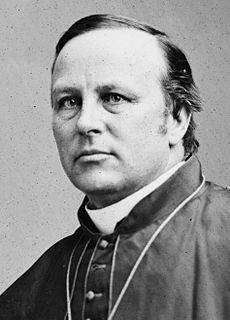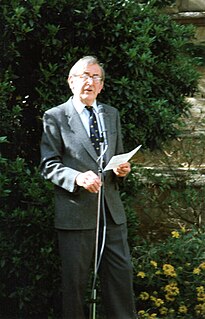Related Research Articles

Magdalen College is a constituent college of the University of Oxford. It was founded in 1458 by William of Waynflete. Today, it is the fourth wealthiest college, with a financial endowment of £332.1 million as of 2019 and one of the strongest academically, setting the record for the highest Norrington Score in 2010 and topping the table twice since then. It is home to several of the University's distinguished chairs, including the Agnelli-Serena Professorship, the Sherardian Professorship, and the four Waynflete Professorships.

Hertford College is a constituent college of the University of Oxford in England. It is located on Catte Street in the centre of Oxford, directly opposite the main gate to the Bodleian Library. The college is known for its iconic bridge, the Bridge of Sighs. There are around 600 students at the college at any one time, comprising undergraduates, graduates and visiting students from overseas.

William Waynflete, born William Patten, was Provost of Eton (1442–1447), Bishop of Winchester (1447–1486) and Lord Chancellor of England (1456–1460). He is best remembered as the founder of Magdalen College and Magdalen College School in Oxford.

The "Magdalen" papyrus was purchased in Luxor, Egypt in 1901 by Reverend Charles Bousfield Huleatt (1863–1908), who identified the Greek fragments as portions of the Gospel of Matthew and presented them to Magdalen College, Oxford, where they are catalogued as P. Magdalen Greek 17 and whence they have their name. When the fragments were finally published by Colin Henderson Roberts in 1953, illustrated with a photograph, the hand was characterized as "an early predecessor of the so-called 'Biblical Uncial'" which began to emerge towards the end of the 2nd century. The uncial style is epitomised by the later biblical Codex Vaticanus and Codex Sinaiticus. Comparative paleographical analysis has remained the methodological key for dating the manuscript, but there is no consensus on the dating of the papyrus. Estimates have ranged from the 1st century to the 4th century AD.

The University College Players are the theatrical society of University College, Oxford.

James Roosevelt Bayley was an American prelate of the Catholic Church. He served as the first Bishop of Newark (1853–1872) and the eighth Archbishop of Baltimore (1872–1877).

Peter Charles Bayley was an English literary critic and academic. He was a fellow at University College, Oxford (1949–1972), the first Principal of Collingwood College, Durham (1972–1978), and Professor of English at the University of St Andrews (1978–1985).
Sir John Bretland Farmer FRS FRSE was a British botanist. He believed that chromomeres not chromosomes were the unit of heredity. Farmer and J. E. S. Moore introduced the term meiosis in 1905.

Sir David Charles Clary, FRS is a British theoretical chemist. He was president of Magdalen College, Oxford, from 2005 to 2020. He was the first chief scientific adviser to the Foreign and Commonwealth Office from 2009 to 2013. He is a Professor of Chemistry at the University of Oxford.
Gerald Leslie Harriss FBA was an English historian of the Late Middle Ages. His work focused on the parliamentary, financial and administrative history of the period. Harriss was a Fellow of Magdalen College, Oxford.
Arthur Stanley Garton was a British rower who competed in the 1912 Summer Olympics.
Leslie Graham Wormald was an English rower who competed in the 1912 Summer Olympics representing Great Britain.
Richard Mayew (1439/40–1516), also written Mayo, was an English academic, who became Bishop of Hereford and a diplomat for Henry VII of England.
Baptist Levinz, sometimes Baptiste or Baptist Levinge, was an Anglican churchman. He is known as a bishop and also for the part he played in the dramatic election at Magdalen College, Oxford.

Richard Bayley was a prominent New York City physician and the first chief health officer of the city. An expert in yellow fever, he helped discover its epidemiology, improved city sanitation, and authored the federal Quarantine Act of 1799. The 1788 Doctors' Riot was sparked by fears that his students were secretly removing corpses from graves in order to dissect them.
John Hagan Pryce Bayley FRS is a British scientist, who holds the position of Professor of Chemical Biology at the University of Oxford.
The Sherardian Chair of Botany is a professorship at the University of Oxford that was established in 1734. It was created following an endowment by William Sherard on his death in 1728. In his will, Sherard stipulated that the first holder of the chair was to be Johann Jacob Dillenius. The Sherardian Professor is also a fellow of Magdalen College, Oxford and Head of the Department of Plant Sciences.

Magdalen College Boat Club (MCBC) is a rowing club for members of Magdalen College, Oxford. It is based on the Isis at Boathouse Island, Christ Church Meadow, Oxford, Oxford.
